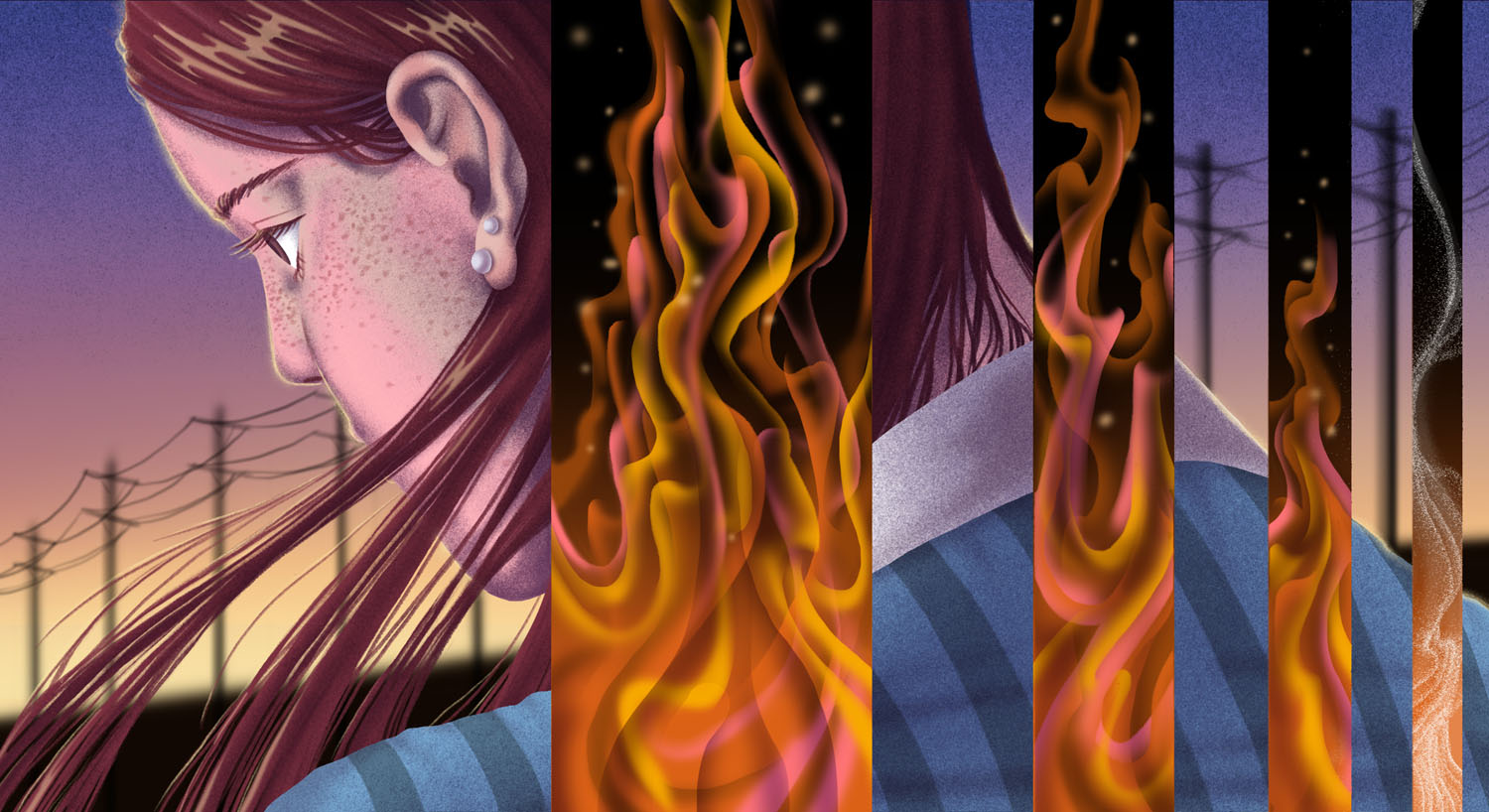The girl was on fire already when she walked into the town square and still she burned for nine more days. Doused in gas and ignited by the roll-spark-puh of a disposable lighter, the girl walked a half mile in broiling summer heat to stand in view of an appreciable portion of the four thousand residents of Ludlow. The girl burned, embered, smoldered; she stank, a perfume of melting Lycra and the chemical evaporation of gasoline.
The girl’s burning hair was already drifting down, an ashy snowstorm in July, when Jerry McKeon—the ex-boyfriend who, two summers back, had unzipped his pants and forced the burning girl’s face into his lap—flipped up the sun visor in his older brother’s Mustang and headed inside to sneak the keys back onto the kitchen hook. Pausing on his middle porch step just a block from Ludlow’s town square, Jerry waved away what looked like swirling gray feathers and coughed on a salty bit of the burning girl that landed on the back of his tongue.
The girl was on fire and the flames scorched the base of a lamppost nearby, yellow graffiti obscured beneath a new script of soot. Laura Bromley and her sister, who for days last year had yellow spray paint staining the webs between their fingers and had spelled slut with two Ts, pumped gas at the station around the corner. As she pulled the nozzle from the tank, Laura noticed a gray film on the car’s windows, then on her skin, and drew a curlicue on her arm with her fingertip.
The fat in the girl’s cheeks flared suddenly orange and high just as the shift supervisor at Geeno’s began his evening ritual—flicking the main lightswitch off, then on, then off; setting the alarm, disarming it, setting it again; and then locking, unlocking, and locking the restaurant’s glass door. In the reflection of that door, not even the lowballing sun on its descent behind the bluffs burned brighter than the girl.
The girl, wearing the laced-up black shoes of her Geeno’s waitress uniform, was on fire and the flames just kept going, resisted the buckets of water, of sand, of foam that Crosby Ducote—second string on the Ludlow volunteer fire squad—tossed at her with a remarkably calm demeanor, at least until that third bucket had no effect and he palmed the back of his neck and cried “Goddammit, somebody get me a goddamn fire blanket.” The wind shifted as the sun hit the horizon with a near-silent sigh and Crosby stepped back from the particles of the burning girl gusting into his eyes.
As the wind shifted, the burning girl’s destruction slowed; the flames took the rough shape of her form and the assembled crowd recognized the belly folds and broad upper arms of Tallulah Johns. Somebody call Reginald, a few began whispering, mumbling, thumbing at their phones; others noticed the long, raised scar running down the front of Tallulah’s right thigh, two or three of them vaguely recalling an incident from her childhood (a soccer game, a bumper car accident), pulling a gauze of wistfulness over them like a fire blanket while the girl, still alive, sunburned them with unabashed heat.
She was burning already when her mom noticed the time and, fanning herself with an old TV Guide, asked Tallulah’s dad if he’d heard the car pull into the drive. Nineteen was too young for her own automobile, Dee had said, but when Reginald brought home the keys to that old sedan with threadbare tweed seats, she’d indulged the sweetness of a father-daughter moment she’d never had herself and waited until she and Reginald retired to the bedroom to pinch his leg high on the thigh where the wiry hair grew sparse.
The girl was on fire when the telephone rang and Reginald and Dee fell heavy to their knees and Dee reached for the keys to her truck and Reginald began running, the yawn and clatter of the aluminum screen door announcing his departure. Dee caught up with him five minutes later and hollered at him to get into the goddamned truck. Reg leapt up to sit in the pickup’s bed and immediately wished that he hadn’t; the exertion of his running had been its own kind of country, with no phone calls, no daughters—nothing but thundering breath and road. The burning girl’s lips, while she still had them, moved as though reciting some elementary-school assignment—the Declaration, the presidents, capitals of each state—as Dee and Reginald rode the next six miles facing opposite directions, their mouths open but forming neither words nor even sounds as the air began to smell of cinder and char.
The girl was on fire, still, when her parents fell again to their knees, this time prostrate before her in the street. For days, the girl burned brighter anytime someone approached with a blanket, extinguisher, hose; she would not be smothered. Her fire burned mercilessly even when the town opened the hydrant a half-block away and droplets exploded from its bolts. The streaming water stopped at the wall of torrid heat around the girl and retreated up the sidewalk. With borrowed goggles and bandanas over their faces, the volunteer firefighters drew near and fell back a dozen times, shouting muffled instructions and blinking away sweat and ash. The burning girl’s face was obscured by smog and by everyone’s resistance to seeing, and no one knew if she was still aware or simply now a blazing wick.
Fire curled around the girl’s shoulders and breasts as Reg stepped between her and the firehose, suddenly fearful the deluge would shatter her. He stood there, the water bruising his sternum as the heat from his daughter’s incineration blistered the back of his neck. If his girl wanted to burn, they damn well would let her burn.
The girl was on fire and her dermis burned until it split and curled away from muscle, fat, and bone while Reginald’s brother, a true-crime fanatic with a mud-flap-girl tattoo, shielded his eyes from the sweltering mess of her and looked instead at his phone—scrolling through years of snapshots and oblique online comments to cobble a list of every boy who’d looked at her since she was twelve. The uncle tore through Ludlow with cocked fists and half-cocked hunches as his subreddit goaded him on.
All the while, the burning girl crackled and glowed.
On the third day of the girl’s burning, Dee, slick with burn ointment—hands to inner elbows and across her freckled chest—after trying twice to embrace the fire that was her baby, watched her girl from the front table at Geeno’s, after the heat from the sun and the fire and her own raw skin nearly stroked her. Cup after cup of milky coffee curdled as Dee never flinched away from Tallulah burning like tallow. Inside Dee’s heartbreak was a fear that everyone would think Tallulah burned so long and hot because she was a big girl, had inherited the unruly body Dee loathed on herself, her wide thighs now being pressed by the narrow arm posts of the metal Geeno’s chair. Tallulah loved her own full body in a way Dee never could, showing off her network of pale stretch marks and dimpled flesh in short little jean skirts and tank tops with skinny straps. How many times had Dee’s own skin run to a boil from the intensity of her hatred of the muscle, fat, bone that she carried—that carried her?
On the fifth day of her burning, the girl dropped into a pugilistic pose, her fire-shrunken muscles contracting her fingers, wrists, elbows, knees, and ankles into a boxer’s stance. Her head tilted on her neck as though afflicted with new thought. The police, who’d adopted a wait-and-see posture, leaned against lampposts as Tallulah’s uncle beat the tar out of that McKeon kid with the Mustang while his little brother looked on. The uncle wasn’t sure what the hell the kid had done, but a bird in the fist was worth two in the bush. Icing his bruised knuckles, Tallulah’s uncle watched thin streams of water run between his curled fingers to dot his trembling knees. Outside in the town square, the girl fell to her shins on the charred blacktop oozing with last summer’s tar patches, running water-like from the heat of her.
The fire was bursting Tallulah’s capillaries with effervescent pops when Pat Geeno, dabbing at his sticky-hot forehead in his in-laws’ kitchen in Gainesville, called in only to have the phone ring unanswered in the near-empty restaurant where Dee and Reginald now sat. The others, like Reg’s brother, paid their respects to the Johnses in this place, visiting dignitaries presenting themselves to the crown. Reg and Dee, together since middle school, caught twenty times by cops’ high flashlights while practicing at making Tallulah—Dee raised by her granny with a forgotten last name, Reg and his big brothers a running terror through these streets for years—both transformed, sanctified, backlit by their only child’s jawline turning to ash.
On the seventh day, it rained.
The thunder rattled through just seconds before the storm and Dee howled, whistled like a teapot as the first dribbles came, smelling and sounding like pennies on the pavement. It was the first rain in a month, and two weeks back, Dee’s greatest irritation was the yellow on her tomato plants.
The hiss that rose from the burning girl could be heard from inside Geeno’s air-conditioned cavern, and the smoke, rising black for six days, paled to a bluish white. Videos of the burning girl, which had of course hit every nook of the internet, were supplanted by new images of the girl who billowed, the girl whose fire disappeared behind the veil of a magician’s smoke screen. While the girl still burned, Tommy Gallenstein watched those videos from his phone’s cracked screen, lying in bed under covers that smelled of his own skin; watched until his phone’s battery drained and the video lagged, became the sluggish movement of giant pixels with no definition at all.
The smoke from the girl plumed into the sky, drawn upward as though a god were inhaling, and Reginald remembered the doctor lifting Tallulah from Dee’s sliced-open abdomen—perfect, purple, hiccupping against his chest—and how in that moment, stoned and teary, he felt like he’d tripped over some bookmark, some central tableau, and that he’d be able to visit this moment from any point in his life and it would be happening, would be now, and he held this sticky six-pound human and felt the heat of the burning teenage girl across the back of his shoulders and neck and he leaned against his seat in Geeno’s air-conditioned tomb, the path back to that minute of grace now and forevermore scalding.
Dee was not thinking of Tallulah’s birth but of those special months that preceded it: that time when Dee and Tallulah were part of their own exclusive club, were part of each other, even if Tallulah was only an idea then. From the moment she came into the outer world, Tallulah was Reginald’s; they were a team and Dee just a spectator. But before that, before Tallulah and Reg developed their standing Sunday brunch dates or ongoing jokes about Dee’s taste in music, it was Dee’s body that had rearranged itself to make room for Tallulah. It was Dee’s stomach that had shrunk and moved upward to sit upon her swollen uterus like a little cap, her liver that had migrated toward her chest cavity. After the birth, she could feel her insides moving back into place, and for the past seven days she had been willing those organs to make way, to make room inside her to take back her baby. She’d take the fire too if she had to.
On day eight, when the rain stopped and the ardent sun returned and licked the fire back into flame, Pat Geeno returned to town and stood outside his restaurant in mirrored sunglasses that made it impossible to say where he was in fact looking. Pat, a veteran of both Kuwait and Afghanistan who was always put off by Tallulah’s wide hips and the extra four dollars he had to spend on her uniform polo, said to the crowd—and then tweeted, when it seemed that no one had heard: “No end to the trouble visited upon our women.”
That night, the last night that Dee and Reginald would spend on the foldout sofa in the front window of Blanchard’s Furnishings (where, in the early days of the burning girl, they could barely black out Tallulah’s flame long enough to feign sleep), they rolled to face each other for the first time since the nightmare had begun. Dee remembered lying this way last winter, hands pressed under head, tears tickling down her wrists, after she and Tallulah had yelled terrifically mean things at each other. She’d thought then: This isn’t who I expected my daughter would be.
Reginald remembered waking in the middle of the night two years earlier at the sound of Tallulah’s door slamming. Hands draped over his chest like a dead man, sheet hiked up over cold, bare feet. When he’d opened her door, she looked up from her phone, sniffling, raccoon eyed, reeking of skunk-ass weed. Don’t tell Mommy, okay?
He hadn’t. He wouldn’t.
He wouldn’t ever stop seeing the fiery-red silhouette of his daughter embossed onto his eyelids. He wouldn’t ever look away.
On the ninth day, when the cops were already deciding to take down several of the road barricades and the crowd had thinned to a dozen or so out-of-towners, the fire reached some last, central part of Tallulah, a fatty abdominal organ still somehow with enough fuel to burst, and the flames that had licked their way into every cell of her puffed into a tunnel of smoke that spiraled aside, like a murmuration of starlings.
Tallulah is on fire when she delivers the wrong order to table two but charms them into over-tipping anyway, when she laughs at Monty’s self-conscious attempts to ask her to make out, when every boyfriend and girlfriend she has runs their two fingers over the six-inch-long centipede of a scar on her thigh and she tells a different story—hurricane, avalanche, boa constrictor—to each. Tallulah’s on fire after Jerry McKeon forces his penis into her mouth until she gags and tells her she ought to be flattered that he’d taken her out; she’s on fire when she uses Jerry McKeon’s baseball trophy to crack the windshield on his brother’s stupid-ass muscle car. Tallulah is on fire when she’s thirteen in her Speedo bathing suit, her thighs rubbing together like a cricket’s, and she climbs up the slick metal steps and presses the soft bottoms of her feet onto the pebbled diving board, swinging her arms and going in for the belly flop at the last second. She’s on fire when she’s eleven and her uncle—the one who’d be dead a year later—looks at her too long and too soft in the face and so she steps into the field neighboring their house and pretends to look up at the sky, but then she does for real, and she sees a hundred—no, more—birds rising up into twilight from the soybean plants, dancing and spiraling in unison like a cyclone moving upward, and she forgets for a moment to breathe. Tallulah is on fire when, at six, she is a superhero, cape whipping as she runs across the parking lot to her daddy’s arms and a boy driving the motorized grocery-cart train doesn’t see her and the day ends with hospital rooms and ice cream cones and the tickle of her mother’s tears. Tallulah remembers, she really does, that she was on fire when her daddy held her for the first time, when he tells her his idea that they could meet there, in that moment, any time they needed to, any time at all.
She’s been waiting for him forever here, it seems.









